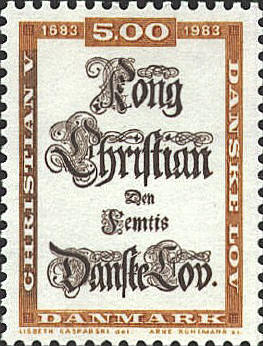|
Jydske Lov ~ 1241
Bishop Gunner was bon in
1152 and educated at the University of Paris. in 1208 he entered the
Cistercian Abbey of Øm (Cara Insula), and became Abbot in 1216. He was
elected Bishop of Vibord in 1222. He probably wrote out the Jydske Lov
(Law of Jutland) and composed the original preface to it. He was
present when it was published at Vordingborg in 1241.

Gulating Lov ~ 11th Century
Magnus Lagaboter's Landslov ~ 1274
A “Ting” in Norwegian is an assembly. The
Gulan Ting, the oldest public legislative assembly in Norway was
established in the first quarter of the 10th century. It developed an
oral law code known as the Gulating Lov. It was probably not written
down until late in the 11th century. The earliest preserved fragments
of the law code are from the late 12th or early 13th century. The only
manuscript of the entire Gulating Lov is dated around 1250. It is
preserved in the University Library in Copenhagen.
In 1274 King Magnus Lagabøte (the Law Mender) produced
a national code of laws for Norway called the Landslov. It was
based on the regional law codes including the Gulating Lov.
The stamp commemorates the 700th anniversary of Magnus
Lagabøter’s Landslov of 1274 with a page of the Gulating Lov
manuscript, which the Scott catalog dates to 1325.

Seyðabrævið
The Seyðabrævið (Sheep
Letter) is the oldest law code in the Faroe Islands. It regulated
land use and economic affairs generally. It include regulations for
whaling, the use of land, the protection of small farmers, runaway
servants, and the capital necessary to set up a household. It
continued in effect until a new code, which included many of its
provisions, was passed in 1866.

Danske Lov ~ 1683
The foundation of Danish
statute law was promulgated by King Christian V. A Norwegian versions
was provided in 1687. Among its provisions is one which states that
the church is tied to the three Ecumenical Creeds, Luther's Small
Catechism, and the Augsburg Confession. Another prohibits Jews from
entering the country and provides a fine for anyone who broke this
law, and a reward for the person who informed against a Jew.
A hundred and thirty years later the newly adopted
constitution of Norway stated that the official state religion was
Lutheran, and also forbade Jews and Jesuits from entering the country.

An initial from the Skarosbók, a law
book from 1363.

An initial Þ,
"thorn," from a law manuscript.

 |
